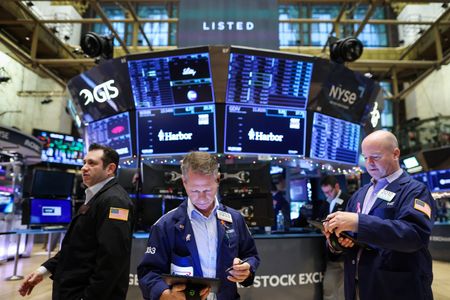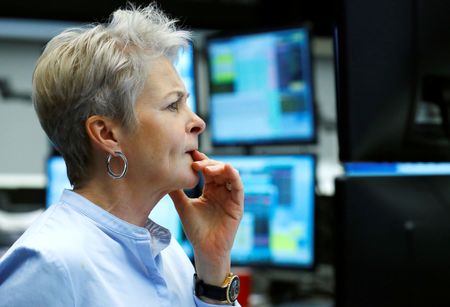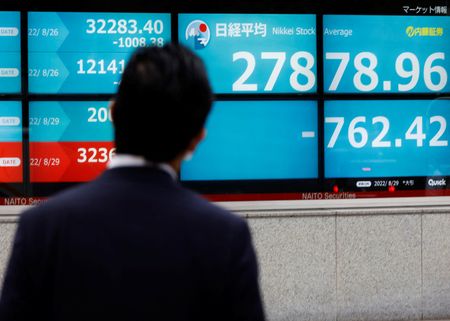By Koh Gui Qing
NEW YORK (Reuters) -Wall Street sparked a global rally in stocks on Friday after a crucial U.S. jobs report showed wage growth slowed in December, fuelling investor bets that inflation is easing and that the Federal Reserve need not be as aggressive as some feared.
Friday’s data showed the U.S. economy added jobs at a solid clip in December, pushing the unemployment rate back to a pre-pandemic low of 3.5% as the labor market stayed tight, while average hourly earnings rose 4.6% in December from a year earlier, down from 4.8% in November.
Even though the data showed a still-robust labor market, investors read it as a sign that the U.S. economy might be poised for a “soft landing” amid rising rates. A cooldown in wage inflation, an indicator the Fed also monitors when addressing price pressures, added to the optimism.
Market cheer over the data helped the MSCI All-World index to leap 2.1%. On Wall Street, the S&P 500 jumped 2.3%, the Dow Jones Industrial Average climbed 2.1% and the Nasdaq Composite surged 2.6%.
Still, some analysts warned such exuberance might be misplaced since Friday’s data argued that policy tightening was far from over.
“Everything else about this shows a very, very resilient labor market which doesn’t bode well for a smaller rate hike,” said Randy Frederick, managing director of trading and derivatives at Charles Schwab in Austin, Texas.
“The odds have been relatively low that we would get a half a point (of rate hike) on Feb. 1, but those odds are going up every day based on all this data.”
But investors paid no heed, especially after a separate report showed the U.S. services industry activity contracted for the first time in more than 2-1/2 years in December.
The currency market also dialed back expectations that the Fed might raise rates by 50 basis points in February, and this pushed the dollar index, which measures the greenback against six counterparts, down 1.2% to 103.90.
U.S. two-year Treasury yields, which track interest rate expectations, dropped to 4.2640%, after spiking to a more than two-month high of 4.497% overnight. The 10-year yield, which rose as high as 3.784% in New York on Thursday, also pulled back sharply to 3.5672%. [US/]
The buoyancy on Wall Street spilled across the Atlantic, pushing Europe’s broad Stoxx 600 equity index up 1.2% higher. Germany’s Xetra Dax also jumped 1.2%. Data on Friday had showed a sharp drop in eurozone inflation. A softer dollar boosted the euro, which climbed 1.2% to $1.0644. The yen also climbed against a weaker dollar, jumping 0.9% to 132.070 on the greenback. [USD/]
Bullion also benefited from declines in the dollar, with the price of spot gold jumping 1.8% to $1,864.94 an ounce. [GOL/]
The energy market appeared to be the only major asset class that bucked the buoyancy, with investors fretting over the prospect of a global recession crimping demand.
Despite a sluggish dollar which tends to bolster the energy market, oil prices gave up earlier gains.Brent crude fell 0.2% to $78.57 a barrel, while U.S. West Texas Intermediate crude futures was largely flat at $73.77. [O/R]
Friday’s data showed the United States added 223,000 jobs in December, down from November’s 263,000 pace, but above the 200,000 jobs forecast by economists, and still about double the level the Fed considers sustainable.
“While the softening trend is clear, and the momentum of hiring is slowing in a significant way, it is equally clear that we are far from what could be described as a demand-reducing weakening of labor and wage conditions,” said Rick Rieder, chief investment officer of global fixed income at BlackRock.
Fed policymakers also had a decidedly more sober take on Friday’s data.
Atlanta Fed President Raphael Bostic said he expects the policy rate this year to get to the range just above 5.00%, and to stay there until “well” into 2024.
That is a stark contrast to traders’ expectations for the policy rate, now in the 4.25%-4.50% range, to top out at 4.75%-5.00% and then for the Fed to begin cutting borrowing costs in the second half of this year.
(Reporting by Naomi Rovnick and Kevin Buckland; Editing by Barbara Lewis, Chizu Nomiyama, Josie Kao and Alexander Smith and Marguerita Choy)



